Camper FAQs is reader-supported. Buying through links on our site may earn us an affiliate commission. As an Amazon Associate I earn from qualifying purchases.
RV generators aren’t exactly cheap, and they are something you don’t want to fail (or fail to meet your power needs) while out camping.
So, I asked the Camper FAQS community for their opinions on the best RV generator… and three brands really stood out.
Let’s first answer the three most important questions to help you find the perfect generator for your needs. Then I’ll reveal what our community chose and highlight a few other popular generators for RV use.
Before Buying a Generator, Ask Yourself These 3 Questions
1. How much power do I need?
We’ve established that you’ll be using your generator for RV use, so you’ll want to look for something that’s got enough power to run your most essential RV appliances and devices.
If you are charging sensitive electronics, like cell phones and laptops, there are generators that handle those better. If you’ll be running a full A/C unit and a microwave, some generators handle those better, too. You just have to know the difference.
In terms of power, there are two things you want to think about: Generator type and output.
Generator Type
Broadly speaking, there are two types of generators: standard and inverter.
- Standard Generators: A standard generator has a basic engine that runs at a set speed from when you turn it on and ends when you turn it off. This works well for job sites or events. It’s straightforward power.
- Inverter Generators: Inverter generators use a microprocessor to monitor how the load changes when you increase (or decrease) it. It auto-adjusts the power output to an appropriate level as those changes occur. So, if you’re charging your laptop, microwaving a burrito, and watching TV, your output will be at one level. Once you finish microwaving that burrito, the power output adjusts to only needing to supply power to the TV and continue to charge your laptop.
Tip: Inverter generators are beneficial for things like microwaves and laptops because they prevent surges that could potentially damage your devices. (In this context, these are referred to as “sensitive” devices.)
Generator Output
Output is the number of watts that a generator puts out. You’ll usually see a larger number and a slightly smaller number.
For example, the Westinghouse iGen2200 below is billed as a 2200-watt portable generator. It outputs 2200 peak watts and 1800 running watts.
Note: You’ll sometimes see peak watts as “surge watts” or “starting watts.”
This means that when the generator has a full load, the max that it can output is 2200 watts. It can’t do this for very long, though. The lower number, 1800 watts, is when the generator is at 25% capacity. This load is what the generator will run at for the listed run time.
Using another example, the WEN 56200i is a 2000-watt portable generator. It outputs 2000 surge watts and 1600 running watts. It will run at 1600 watts for about 10 hours on a full gas tank.
Check out our guide on how to find the right-sized generator for your camper to ensure you’ll never be left without power!
2. Where are you running your RV generator?
If you plan on camping with a generator, your generator needs to produce no more than 70 dBAs for you to avoid being asked to turn your generator off (or being asked to leave). These guidelines vary from park to park. Generally, though, a noise level between 60 and 70 decibels is an acceptable range.
![]() Did you know…
Did you know…
If it seems like your generator is louder than normal, it may be time for an oil change.
The location also brings portability into question. Will you be installing it for use exclusively on your RV? Or will you be using it for camping, as a backup power source during power outages, at job sites, or anything else? Generators are so versatile that you can find one that does some or all of these things, but you want to know what you’re looking for beforehand.
If you are going to install the generator, like with the Cummins model below, you should find an expert to do it for you. Generators provide power, and you don’t want to be stuck without it at a campsite. Some generators have complex installation instructions. You should also check its dimensions. Ensure that the generator you’re looking at actually fits into your RV before you purchase it.
Installations also come with separate fees. Keep that in mind as you consider how much you are willing to spend.
If you don’t want to install your generator, you’ll need to decide on whether to purchase a portable RV generator or not. Now, just because a generator isn’t labeled “portable” doesn’t mean that you can’t move it. It typically means that it won’t come with wheels and a handle installed.
In some cases, like with the Durostar DS4000S 4000-watt portable generator, it is portable but doesn’t come with wheels. They’re sold separately. Ultimately, a big question in “portability” is weight. Will you need to pick the generator up? If so, can you? Check out how heavy a particular generator is before purchasing it (if heavy lifting is not in your plan).
3. What kind of fuel do I need?
Gas is the most common type of fuel for generators. All of the units in our list of generator reviews above are gas-powered.
However, some generators use liquid propane or diesel to power them. And some use two different fuel sources, like the Champion 3800-Watt Dual Fuel Portable Generator, which can operate on gas or liquid propane.
The important thing here is to understand how your power draw affects fuel. Again, using the WEN 56200i as an example: you get 10 hours on a 1600-watt load and a full tank of gas. This model carries about 1 gallon of fuel in its tank.
From there, it’s simple math. Take the number of hours you will be using your generator and divide that by 10. That’s how much fuel you’ll need. Make sure that the number is worth it when you decide to purchase a generator.
Community Generator Picks
Now, let’s get to the fun stuff! I asked our community their opinions and the best RV generators and why.
The three brands that really stood out are:
- Champion
- Westinghouse
- Honda
Below, I take a look at some of the most popular generator models for these recommended brands and what real RVers had to say about them. I also included the Onan Cummins for those looking for a more permanent solution.
1. Westinghouse iGen2200 Inverter Generator
I’ve had both a Honda and a Westinghouse. Both were super quiet, around 50 decibels, and lightweight. But, the Westinghouse is arguably the most efficient of the two. If you ever plan on boondocking I’d go with the Westinghouse.
IA_Camper
The Westinghouse iGen2200 Inverter Generator is a small but mighty generator ideal for use in an RV. It is lightweight (46 pounds) and comes outfitted with a carrying handle.
Its low THD levels (less than 3%) make it a good inverter generator option for powering small, sensitive devices like laptops and tablets. Additionally, it is strong enough to power all essential home devices with 2200 peak watts (1800 watts running).
If you find that you need more power, this generator is parallel-compatible. You can connect it to another Westinghouse generator using an inverter parallel cord (not included).
This generator also boasts great fuel efficiency. In fact, it’s up to 3 times more efficient than traditional generators! So, you can expect up to 12 hours of use on the 1.2-gallon gas tank. Very impressive!
Moreover, it has a high-efficiency mode. When you activate this option, the generator automatically adjusts how much power it’s generating (and how much fuel it is consuming) based on what is plugged into any (or all) of its four ports: two 120-volt 20-amp outlets and two USB ports.
The safety features of this inverter generator make it an attractive option, too. It has a low-oil shutdown, overload protection, and a built-in spark arrestor to prevent accidents. It is also EPA, USFS, and CARB-compliant.
With all of these features and its 79cc engine, it is still quiet. The Westinghouse iGen2200 comes with low-tone mufflers that keep sounds under control. The sound for this generator measures in at 52 dBA making it perfect for camping sites.
It comes with three years of limited service, labor, and parts coverage. You also have access to nationwide customer service and support.
Pros
- Ultra-light – 46 pounds
- Quiet – only 52 dba
- Fuel-efficient – 3 times more efficient than traditional generators
- Versatile
- Clean energy
Cons
- Complicated break-in process
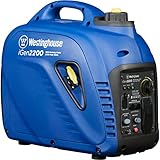
Westinghouse iGen2200 Super Quiet Portable Inverter Generator
Price:Clicking this link to make a purchase may earn us a commission at no additional cost to you.
2. WEN 56200i 2000-watt Portable Inverter Generator
The trick is finding the right balance between power, quietness, and affordability. A Westinghouse or Wen will provide the best of all worlds, imo.
Lawrence Smith
The Wen 56200i is great for campsites because it is well under the average dBA limit. It is dubbed “quieter than a window air unit,” measuring in at 51 dBAs. In fact, it earned the title of “quietest generator” by our staff!
This generator is all about efficiency. It is easy to carry, weighing 48 pounds with a handle for easy transport. THD levels range between 0.3% (no load) and 1.2% (full load), which will power a versatile array of electronics with clean energy.
This generator has the least amount of power on this list (also one of the least expensive) at 2000 surge watts and 1600 running watts. If you need more power, though, it is parallel cable compatible.
There are plenty of plug options to power various devices, including two 3-prong 120-volt receptacles, one 12-volt receptacle, and one 5-volt USB port. With the eco-mode feature, the generator will adjust its fuel consumption to match the power output at any given time.
Other safety features of the WEN 56200i are overload protection, low-fuel shutoff, and low-oil shutoff to protect the generator and any devices plugged into it. All of these protections have indicator lights shown on the inverter generator’s display.
This generator is gas-powered and carries 1 gallon of fuel in its tank. It is EPA III and CARB compliant. You get a 2-year warranty with a nationwide network hotline to assist you with any issues you may have.
The one complaint I’ve read about this generator is that although it is small, it is a little taller than expected. Otherwise, the WEN 56200i is small and less expensive, but it holds its own on the market and serves as a versatile and practical choice for a portable generator.
Pros
- Low price point
- Quiet
- Fuel-efficient with an economy mode feature
- Clean energy
- Versatile
- Small
- Parallel-compatible
- Great safety features: low-fuel shutoff, low-oil shutoff
- Easy-to-read panel
Cons
- Taller than expected
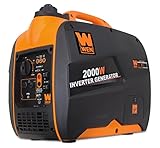
WEN 56200i Super Quiet 2000-Watt Portable Inverter Generator
Price:Clicking this link to make a purchase may earn us a commission at no additional cost to you.
3. Champion 3500-watt Portable Generator with Wireless Remote Start
I’ve been using the Champion 4375 for years and love it. Starts in all weather, less than 70 dBs, strong enough to run my 15,000 BTU AC, and I could keep going. I’ve only ever had a Champion, so its hard to compare it to anythign else, but I’ve never had a reason to switch.
Bill Greene
To start, the Champion 3500-watt portable generator is wireless remote-start capable from up to 80 feet away. If you’re close, though, just use the touch start. These options already make the unit easy to use.
The 196cc engine makes it one of the more powerful generators on this list. Moreover, it uses an electric start system. If you’re in a cold-weather situation, there is no need to worry. This generator is designed with cold-start technology, so you’ll be up and running in no time.
The fuel tank on this generator holds almost 4 gallons of gas. There’s also an easily readable gauge on the control panel where you can see where your fuel levels are, too.
Similar to its predecessor, the Champion 3500-watt portable generator is RV-ready with a 120-volt 30A locking, 120-volt 30A RV, and two 120V 20A outlets. You’ll have no issues powering your RV with this model.
This generator produces 4000 starting watts and 3500 watts running at 25% capacity. With that and the 4-gallon gas tank in mind, you’re looking at a 12-hour run-time.
It comes equipped with a built-in surge protector to prevent overload. It also has low-oil shutoff capabilities.
For its 124-pound size, this “portable” generator is fairly quiet. It hits about 68 dBAs from 23 feet, which may bother some fellow campers at your site since it’s at the higher end of the allowed decibel range for campsites.
A general complaint about this generator is that it is too big to be classified as portable. It also does not have inverter technology, so sensitive objects are susceptible to issues.
This model comes with a 3-year limited warranty and free lifetime tech support.
Pros
- High power
- Long run-time
- RV-ready
- Remote and Push-start for convenience
- Great safety features: low oil shutoff, built-in surge protector
- Built-in cold start
Cons
- Not as fuel efficient (no inverter technology)
- Not as safe for sensitive devices
- Large and Heavy

Champion 3500 Watt Portable Generator | Wireless Remote Start
Price:Clicking this link to make a purchase may earn us a commission at no additional cost to you.
4. Champion 3800-watt Dual Fuel Portable Generator
I’ll throw in my vote for the Champion as well. I have a dual fuel. Have had no issues with it for years. If I had to buy a new one now, I’d splurge on a dual-fuel inverter. Probably Champion if I could get a good deal.
Tory Jon
This generator is unlike anything on this list so far because it is dual fuel. The option to run this model on gas or propane makes it uniquely versatile. The freedom to choose which fuel source to use opens up new financial options, longer life on a single fuel source, and convenience.
On top of that, the unit can produce a lot of power. The watts peak at 4750 watts with a running wattage of 3800 watts. With a full tank of gas (3.4 gallons), you can get 9 hours out of this unit. With a full 20-pound propane take, that time bumps up to 10 ½ hours of run time.
The Champion 3800-watt uses a marvel 4-stroke single-cylinder 224cc engine that uses push-start technology. The push-start technology uses a battery (included) and charges internally while the generator is running.
There are four outlets: one 20-volt 30A RV, one 120-volt 30A locking outlet, and two 120-volt 20A household outlets. This unit uses Volt Guard to protect the outlets from power surges. It also has a low-oil shutoff. You can find all the indicator lights and switches on the main control panel.
For the amount of power this unit produces, it’s still somewhat quiet (relatively speaking). It measures 68 dBAs from 23 feet away.
The generator is rugged and durable. It is outfitted with a cast-iron sleeve and has a drop-down handle to pull on its wheels for easy portability. The whole unit weighs 119 pounds and is quite compact. You can find an LED control panel on the side.
The only real complaint about this generator is that the advertised measurements for the sound are wrong, and it’s heavy. Otherwise, this unit is almost a necessity with all of its features and versatility. This unit is CARB compliant in all 50 states.
Pros
- Dual fuel
- Long run-time
- High power: will meet or exceed all your power needs
- Great safety features: surge protection, low-oil shutoff
- Portable
- Durable
- Versatile
Cons
- Heavy
- Loud

Champion 3800-Watt Dual Fuel RV Ready Portable Generator with Electric Start
Price:Clicking this link to make a purchase may earn us a commission at no additional cost to you.
5. Cummins ONAN RV QG 4000 Generator
The Cummins Onan 4000w generator is significantly more expensive than portable generators (around 5 times the other generators on this list). However, it can easily run a 13,500 BTU air conditioner with plenty of power to spare.
This unit needs to be installed in your RV, so be sure you have ample space. The dimensions of the QG 4000 model are 30L x 19.7W x 14.4H. Cummins does offer various sizes, so if you need something a little smaller or have room for a more powerful and larger model, you have options.
This generator is gas-powered and weighs 172 pounds. It has an easy-to-reach side door for fueling.
Are you worried about noise from such a powerful unit? Don’t be! The enclosed muffler gives it its reputation for being an extremely quiet unit. In fact, it measures 68 dBAs from about 10 feet away and meets National Park Service sound level requirements.
The Cummins Onan QG 4000 is a reliable unit, which they back with a 3-year limited warranty. The only complaints about it revolve around the fact that it isn’t portable. This unit is CARB-compliant.
Learn more about the Cummins brand with this quick video.
Pros
- 3-year warranty
- Powerful
- Compact
- Muffler to help keep unit quiet
- Easy electric start
- CARB-compliant
Cons
- Not portable
- Expensive

Cummins ONAN RV QG 4000 Generator
Price:Clicking this link to make a purchase may earn us a commission at no additional cost to you.




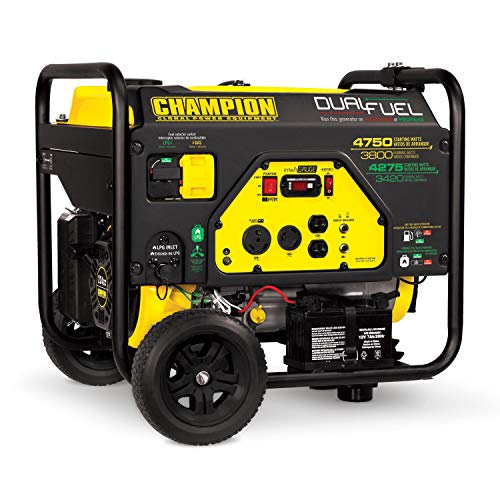

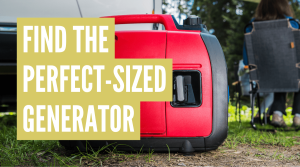




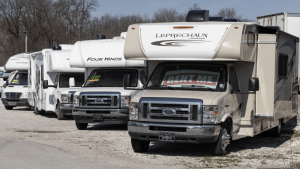
Write a comment